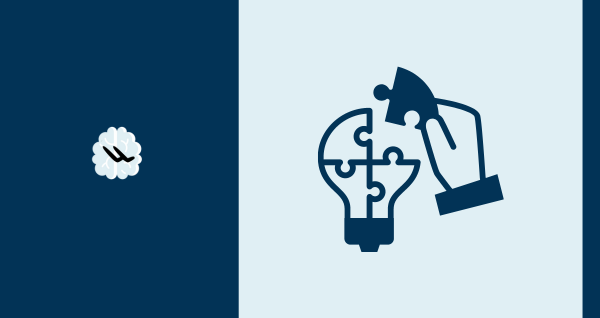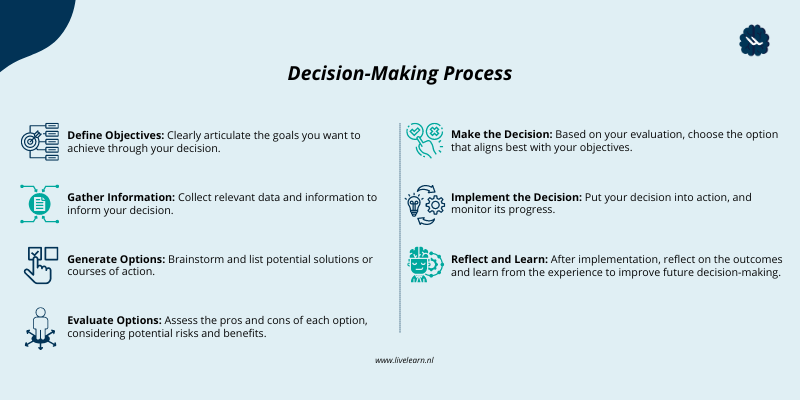
Artikel
11
december
Problem-Solving Skills: A Guide to Becoming a More Effective Decision Maker
In today’s fast-paced and complex world, effective problem-solving skills are crucial for success in both personal and professional spheres. Whether you’re facing challenges at work, in relationships, or in daily life, honing your decision-making abilities can make a significant difference. This guide aims to explore the key aspects of problem-solving skills and provide actionable strategies to become a more effective decision-maker.
Understanding the Problem:
The first step in solving any problem is to clearly understand it. Take the time to define the issue, identify its root causes, and consider the potential consequences. This process requires a keen analytical mind and the ability to break down complex problems into manageable parts. Avoid rushing into solutions without a thorough understanding, as this can lead to ineffective decisions.
Developing Critical Thinking:
Critical thinking is the cornerstone of effective problem-solving. It involves evaluating information objectively, considering different perspectives, and making informed judgments. To enhance your critical thinking skills, actively seek out diverse viewpoints, question assumptions, and analyze information from multiple sources. Engaging in activities that challenge your mind, such as puzzles or debates, can also sharpen your critical thinking abilities.
Creativity and Innovation:
Sometimes, conventional solutions may not suffice for complex problems. This is where creativity and innovation come into play. Cultivate your creative thinking by exploring new ideas, brainstorming, and embracing a mindset that welcomes unconventional solutions. Encourage yourself and others to think outside the box, fostering an environment where innovation can thrive.
Decision-Making Process:
Once you have a comprehensive understanding of the problem and have generated potential solutions, it’s time to make a decision. Develop a systematic decision-making process that includes the following steps:

Define Objectives: Clearly articulate the goals you want to achieve through your decision.
Gather Information: Collect relevant data and information to inform your decision.
Generate Options: Brainstorm and list potential solutions or courses of action.
Evaluate Options: Assess the pros and cons of each option, considering potential risks and benefits.
Make the Decision: Based on your evaluation, choose the option that aligns best with your objectives.
Implement the Decision: Put your decision into action, and monitor its progress.
Reflect and Learn: After implementation, reflect on the outcomes and learn from the experience to improve future decision-making.
Emotional Intelligence:
Emotional intelligence plays a significant role in effective problem-solving. Being aware of your own emotions and those of others can help you navigate challenging situations with empathy and resilience. Develop your emotional intelligence by practicing active listening, expressing yourself assertively, and managing stress effectively. A balanced emotional state enhances your ability to make rational decisions even in emotionally charged situations.
Continuous Learning:
Problem-solving is a skill that evolves over time. Embrace a mindset of continuous learning and improvement. Seek feedback on your decisions, learn from both successes and failures, and stay open to adapting your problem-solving approach based on new experiences and insights.
Becoming a more effective decision-maker and problem solver is a journey that requires dedication and practice. By understanding problems thoroughly, honing critical thinking skills, fostering creativity, following a systematic decision-making process, and cultivating emotional intelligence, you can enhance your problem-solving abilities. Embrace challenges as opportunities for growth, and remember that the journey toward becoming a more effective decision-maker is ongoing and rewarding.
What's your reaction ?
Follow us on Social Media
Some Categories
Recent posts

July 27, 2024
Nieuwe kabinetsvisie: samen sterker tegen cyberdreigingen

July 24, 2024
Navigating AI Implementation: Try these strategies to overcome resistance.

July 24, 2024
Sick Leave Policy Netherlands Guidance for HR and Entrepreneur.

July 24, 2024
CSRD Reporting: Mandatory Reporting on Corporate Sustainability.

July 24, 2024
Training Budget: Investing in Employee Development.

 Inloggen
Inloggen
 Registreren
Registreren






Comments (0)
No reviews found
Add Comment